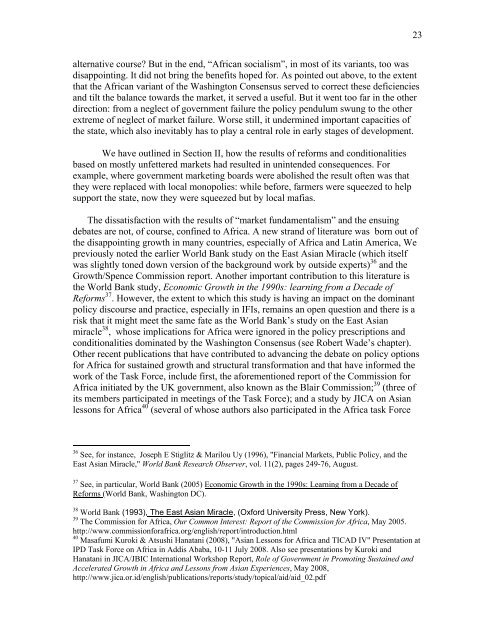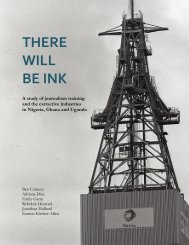Paper - Initiative for Policy Dialogue
Paper - Initiative for Policy Dialogue
Paper - Initiative for Policy Dialogue
You also want an ePaper? Increase the reach of your titles
YUMPU automatically turns print PDFs into web optimized ePapers that Google loves.
23<br />
alternative course But in the end, “African socialism”, in most of its variants, too was<br />
disappointing. It did not bring the benefits hoped <strong>for</strong>. As pointed out above, to the extent<br />
that the African variant of the Washington Consensus served to correct these deficiencies<br />
and tilt the balance towards the market, it served a useful. But it went too far in the other<br />
direction: from a neglect of government failure the policy pendulum swung to the other<br />
extreme of neglect of market failure. Worse still, it undermined important capacities of<br />
the state, which also inevitably has to play a central role in early stages of development.<br />
We have outlined in Section II, how the results of re<strong>for</strong>ms and conditionalities<br />
based on mostly unfettered markets had resulted in unintended consequences. For<br />
example, where government marketing boards were abolished the result often was that<br />
they were replaced with local monopolies: while be<strong>for</strong>e, farmers were squeezed to help<br />
support the state, now they were squeezed but by local mafias.<br />
The dissatisfaction with the results of “market fundamentalism” and the ensuing<br />
debates are not, of course, confined to Africa. A new strand of literature was born out of<br />
the disappointing growth in many countries, especially of Africa and Latin America, We<br />
previously noted the earlier World Bank study on the East Asian Miracle (which itself<br />
was slightly toned down version of the background work by outside experts) 36 and the<br />
Growth/Spence Commission report. Another important contribution to this literature is<br />
the World Bank study, Economic Growth in the 1990s: learning from a Decade of<br />
Re<strong>for</strong>ms 37 . However, the extent to which this study is having an impact on the dominant<br />
policy discourse and practice, especially in IFIs, remains an open question and there is a<br />
risk that it might meet the same fate as the World Bank’s study on the East Asian<br />
miracle 38 , whose implications <strong>for</strong> Africa were ignored in the policy prescriptions and<br />
conditionalities dominated by the Washington Consensus (see Robert Wade’s chapter).<br />
Other recent publications that have contributed to advancing the debate on policy options<br />
<strong>for</strong> Africa <strong>for</strong> sustained growth and structural trans<strong>for</strong>mation and that have in<strong>for</strong>med the<br />
work of the Task Force, include first, the a<strong>for</strong>ementioned report of the Commission <strong>for</strong><br />
Africa initiated by the UK government, also known as the Blair Commission; 39 (three of<br />
its members participated in meetings of the Task Force); and a study by JICA on Asian<br />
lessons <strong>for</strong> Africa 40 (several of whose authors also participated in the Africa task Force<br />
36 See, <strong>for</strong> instance, Joseph E Stiglitz & Marilou Uy (1996), "Financial Markets, Public <strong>Policy</strong>, and the<br />
East Asian Miracle," World Bank Research Observer, vol. 11(2), pages 249-76, August.<br />
37 See, in particular, World Bank (2005) Economic Growth in the 1990s: Learning from a Decade of<br />
Re<strong>for</strong>ms (World Bank, Washington DC).<br />
38 World Bank (1993), The East Asian Miracle, (Ox<strong>for</strong>d University Press, New York).<br />
39 The Commission <strong>for</strong> Africa, Our Common Interest: Report of the Commission <strong>for</strong> Africa, May 2005.<br />
http://www.commission<strong>for</strong>africa.org/english/report/introduction.html<br />
40 Masafumi Kuroki & Atsushi Hanatani (2008), "Asian Lessons <strong>for</strong> Africa and TICAD IV" Presentation at<br />
IPD Task Force on Africa in Addis Ababa, 10-11 July 2008. Also see presentations by Kuroki and<br />
Hanatani in JICA/JBIC International Workshop Report, Role of Government in Promoting Sustained and<br />
Accelerated Growth in Africa and Lessons from Asian Experiences, May 2008,<br />
http://www.jica.or.id/english/publications/reports/study/topical/aid/aid_02.pdf














